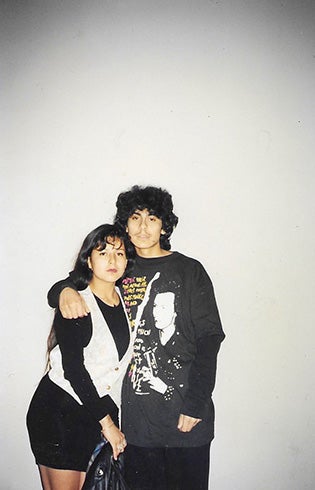
Ska in the family: Fellowship allows student to research her family’s favorite music
To many Americans, ska might seem like a relic of the mid-1990s. Its peak in mainstream cultural awareness was probably No Doubt’s “Tragic Kingdom” album, which topped the charts with its sassy, reggae-influence rock in 1995.
But, for Los Angeles’ Mexican and Mexican American population, ska never went out of style. Hundreds of Mexican ska shows take place every year across the city, in tiny backyards and in large clubs crowded with fans bobbing along to ska’s wriggling bassline.
Ska has had such staying power that the music has become a multigenerational affair. If you run into Isis Galeno at a show, her parents will probably be standing right next to her. The couple have been attending shows since the 1990s, and they’ve made ska music a Galeno family tradition.

Isis Galeno’s parents, Janneth Galeno and Adalberto Galeno, shown here in the early 1990s, made ska music a family tradition.
Galeno, who graduated recently from the USC Dornsife College of Letters, Arts and Sciences with dual degrees in anthropology and NGOs and social change, got to dive into the family’s pastime by researching the history of ska in L.A.’s Mexican American communities. A prestigious Mellon Mays Undergraduate Fellowship supported her work.
For Galeno, ska is more than just zippy tunes. It’s also a form of empowering political commentary. “It’s very important stuff that the songs are covering, stuff that’s affecting mostly communities of color and low-income communities,” says Galeno. “I think what’s contributed to its longevity is how political the music is. There’s always something to criticize in politics.”
Mapping music
Galeno already knew she wanted to major in anthropology when she arrived at USC, thanks to her mom’s avid interest in the subject. She grew up with anthropology books scattered throughout the house.
A class with Scott Spencer, an assistant professor at the USC Thornton School of Music, introduced Galeno to the field of ethnomusicology. She doesn’t play an instrument, and she hadn’t known there was a way for someone like her to study music. Ethnomusicology, which studies the cultural and social aspects of music and musicians, provided an opportunity to explore the subject from an anthropological angle.
“I took the course and I knew this was exactly what I wanted to do,” says Galeno. “I got so much out of that class. That’s when I first started my research.”
Her Mellon Mays Fellowship has helped support this work, but she almost didn’t apply to the program due to the lengthy application process and anxiety about failure.
“I didn’t want to apply if they were just going to reject me,” says Galeno. “But then I decided I should just do it because in the long run it would be good for me. I actually ended up getting it. I think there’s a lesson in there.”
Researching a music scene that hinges on live performance has been a challenge during the COVID-19 pandemic, but Galeno found a workaround. Using addresses from old show fliers, she’s been mapping out the spread of Mexican American ska music across Los Angeles over the past several decades.
The next generation
Galeno is the first in her family to graduate from college and she’s made sure to lend a hand to other students in her position. While at USC Dornsife, Galeno was the president of the Latinxs Empowering Academic Progression student club, which works to get more underrepresented students, especially Hispanic students, enrolled in college.
“College is very difficult to navigate, especially for someone who doesn’t know anyone who’s gone through it,” says Galeno. “Our goal was to try to let the students know that they are not alone in the process.”
She’s currently a Student Success Coach at the California Student Opportunity and Access Program, Los Angeles, which provides support services to public school students. She helps a caseload of 100 high school seniors prepare their applications for college. One student of hers was recently accepted to the University of Oregon, along with numerous other universities.
“When we first started working together, she was very unsure about her writing,” says Galeno. “It’s such a rewarding feeling knowing that you helped contribute to the success of the student.”
Galeno is in the process of finishing her own college applications, this time to graduate school. She hopes to attend USC Dornsife for a Ph.D. in American studies and ethnicity. Her research into ska music has formed the core of her writing sample.
This summer, she’ll be headed right back out to shows once COVID-19 restrictions are lifted — her parents alongside for the fun.